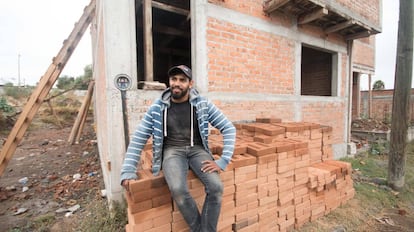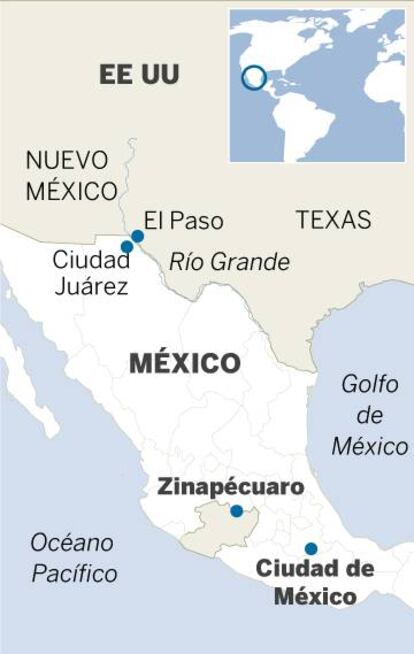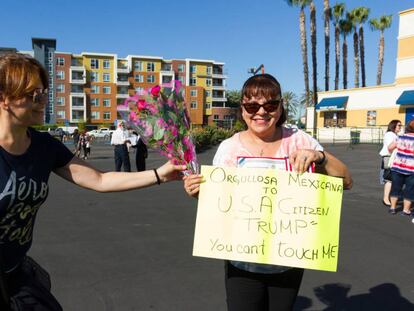Mexicans fear for future after Trump threats to block money transfers
US president elect warned he could halt remittances to make Mexico pay for border wall

It’s a busy morning in the market of Zinapécuaro, in the northern Mexican state of Michoacán, with around a dozen stallholders setting up shop on improvised stands. Some are cutting up prickly pear and laying out fresh vegetables while others ready displays of fish in their death throes. But other invisible hands also play their role in the local economy. They are the migrants who have gone to the United States and last year sent $2.5 billion to Michoacán – the most of any state in Mexico.

Municipalities like Zinapécuaro are now facing an uncertain future because of Donald Trump’s plans for the mass deportation of up to three million Mexican migrants who have committed crimes, and due to his desire to build a wall between the US and Mexico using cash from money transfers made by Mexicans living in the US to their families back home.
In a memo from earlier this year, Trump said he planned to fund the wall by threatening to block remittances from Mexican immigrants living illegally in the US to their families back home – a move that would seriously damage the Mexican economy where such money transfers make up 2% of GDP. Those remittances would only be allowed to flow again once the Mexican government agreed to make a one-time payment for the cost of building the wall.
“It’s an easy decision for Mexico,” Trump wrote at the time.
There is fear, but there is also faith in God Local resident René García
“We have been living from dollars for a long time,” says Abraham Villafuerte,a 39-year-old bird-seller, who is dressed in jeans and a wide-brimmed sombrero.
Like most of the 47,500 people who live in Zinapécuaro, Villafuerte has spent several stints as an illegal immigrant in the US. He has worked on farms in Maryland and North Carolina. After Trump’s win, he remains cautiously optimistic.
“This asshole isn’t the only one in charge: I don’t think he can do everything he has promised. I agree that they should deport people who have done the wrong thing and I think that’s what’s going to happen.
A few kilometers up the road from Zinapécuaro is the Francisco Villa housing estate where the role played by migrants is no secret. Opposite a popular roadside diner is an imposing two-story house with a summerhouse, which wouldn’t be out of place in an upscale neighborhood of any wealthy city. Everyone knows the owner is a yardinero, or gardener in Los Angeles.
At the moment, the housing estate is like a ghost town. “In December, everyone arrives and there is all sorts of activity,” says Daniel Escobedo, a 24-year-old who dropped out of both seminary school and an economics degree and who is now the supervising the construction of a house being built for a migrant who lives abroad. It’s a job that brings in $230 a month.
The arrival of Trump has left Escobedo with plenty of doubts. “It’s going to be a very difficult situation. What will happen to the immigrants?”
What Trump is trying to do is legally very complicated Jerjes Aguirre, economics professor
But the experts believe it won’t be easy for Trump to carry out his plans to take control of the remittances of Mexicans to build a wall along the Mexico–US border.
“It would difficult to tax or block [the remittances] but there could be attempts to control these resources. It would be very inhumane because it would affect the poorest of the poor,” explains Jerjes Aguirre, professor at the Institute of Economic and Business Studies at the University of Michoacán.
“What he is trying to do is legally very complicated,” he adds.
The development of the Francisco Villa housing estate is closely linked to people living in the US. A Chicago-based club set up by migrants from Zinapécuaro pays for a third of the work done here. Last year, the club sent $250,000 to be used for the development of infrastructure. But people are worried about the possible confiscation of remittances.
“We are going to go backwards,” says Jimmy León, who spent 17 years in the US. “This was an ugly little place with streets full of mud, he adds, explaining how money being sent from across the border has paid for the streets to be asphalted, not to mention renovations to the local school and medical clinic as well as the prettification of the town square. Now the money is going into marble for the local church.
But the politics of Trump could create more than just economic havoc for the state of Michoacán. With nearly four million residents of the state living in the US, a culture shock is also on the cards.

“People who live there have a much more open mentality and people here aren’t ready for that,” says Daniel Escobedo.
René García is living proof. This 40-year-old, originally from Otumba in Mexico State, has spent so long in the US that Spanish doesn’t come easily to him. García was deported four years after being imprisoned for his role in a gang brawl.
The US government has prohibited him from returning to the country for 10 years, which means he hasn’t seen his daughters. But with a year of his sentence still be served, he has little desire to return to the US. In the next few days he will open a tattoo studio in Zinapécuaro: he is skeptical about Trump.
“In four years he is not going to be able to do everything he wants,” he says. But a few minutes later he says something else which reveals the jittery state of people in the area. “There is fear, but there is also faith in God.”
English version by George Mills.
Tu suscripción se está usando en otro dispositivo
¿Quieres añadir otro usuario a tu suscripción?
Si continúas leyendo en este dispositivo, no se podrá leer en el otro.
FlechaTu suscripción se está usando en otro dispositivo y solo puedes acceder a EL PAÍS desde un dispositivo a la vez.
Si quieres compartir tu cuenta, cambia tu suscripción a la modalidad Premium, así podrás añadir otro usuario. Cada uno accederá con su propia cuenta de email, lo que os permitirá personalizar vuestra experiencia en EL PAÍS.
En el caso de no saber quién está usando tu cuenta, te recomendamos cambiar tu contraseña aquí.
Si decides continuar compartiendo tu cuenta, este mensaje se mostrará en tu dispositivo y en el de la otra persona que está usando tu cuenta de forma indefinida, afectando a tu experiencia de lectura. Puedes consultar aquí los términos y condiciones de la suscripción digital.










































